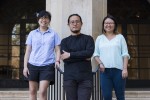Taiwan elected its first female president in 2016 and, just a year later, the Taiwanese constitutional court ruled in favor of same-sex marriage.
The events marked some of Asia’s first steps toward a more socially progressive society and inspired graduate production design student Hogan Lee to showcase LGBTQ-themed films made by female Asian filmmakers, he said.
Lee and the Taiwan Academy in Los Angeles, a nonprofit extension of the Taiwanese Ministry of Culture, will screen three film and video projects related to LGBTQ themes, two of which were created by UCLA Master of Fine Arts students. The screenings will take place on Oct. 3 at the Westwood Taiwan Academy on Westwood Boulevard.
The screening, hosted in conjunction with UCLA Residential Life and the UCLA LGBT Resource Center, will be followed by a roundtable discussion between the filmmakers on issues including filmmaking, Asian identity, gender equality and LGBTQ rights. The films all showcase the different perspectives of the three writer-directors and explore an intersectional and diverse portrait of identity.
For Lee, the event is an important way to raise awareness for different minority identities, as well as to spotlight an underrepresented demographic of filmmakers – Asian women making films that touch on LGBTQ identity.
“Even though we speak up, our voices are still being ignored by the society (as a whole) or by whoever doesn’t care about it,” Lee said. “There’s still so many things that are going wrong, not to mention a lot of problems with races and gender and human rights – personally I really hope people can raise their awareness.”
Ashley Sun, the Taiwan Academy’s senior cultural officer, said the event will also emphasize the multicultural nature of the United States and of Los Angeles.
“We’re trying to help each other to understand the others more … help the audience understand other cultures that are living among this society,” Sun said.
Planning for the event began in spring 2017 when Sun told Lee about the work of Taiwanese artist Zhijin Tsai, who was coming to Los Angeles from Paris for an artistic residency. Tsai had just completed an experimental video work entitled “24 Hours,” inspired by the life and writings of the famous 20th-century openly lesbian Taiwanese novelist Qiu Miaojin.
While Tsai’s work isn’t a biography of Miaojin or even an autobiography, it does explore the universal feelings of loneliness and isolation that can be felt both by those who are a part of the LGBTQ community and those who are not, she said.
After being introduced to Tsai and her work, Lee and the Taiwan Academy decided to show “24 Hours” alongside other films with LGBTQ themes by Asian directors. Lee reached out to his friend and graduate directing student Jessica Fuh, who agreed to screen her film “Us,” a piece about two female roommates who attempt to come to terms with the feelings they have for each other as their friendship evolves.
Fuh said she wanted her characters’ LGBTQ identities to be just one facet of their character rather than the focus, emphasizing emotional realism and complexity over tropes from LGBTQ films that sometimes reduce identity to the sole idea of being closeted or coming out, she said.
“We’re sort of moving forward LGBT topics of movies that have shifted away from just the topic of being gay in itself into more sort of humanistic topics,” Fuh said. “LGBT lives are more normalized in movies. … I think that it’s just part of normalizing LGBT stories when you start focusing on other aspects of life or other aspects of a relationship other than hiding who you are.”
Fuh then recommended including graduate directing student Amber Ha in the film screening event, as Ha was working on “Things We Carry,” a family drama about a closeted lesbian character and her relationship with her father. Ha said she used the film to explore the intersection of Korean culture with LGBTQ identity.
“Especially in Korean culture – and I think from what I see in Asian culture – we tend to not really talk about things within families,” Ha said. “That was kind of what inspired it – wanting to explore this idea of the impact that keeping secrets has on this individual and family and how it’s generational.”
The roundtable following the screening of the three films will discuss similar themes as each participant dives into their personal approach to the various identities within the films and talks about their own personal background and perspective, Tsai said.
The discussion will also serve as a platform to amplify the voices of the three female Asian directors, in an effort to normalize the representation of Asian women in the film industry, Fuh said.
“It’s really important to just have these sort of events where you present female artists and we’re all making different sorts of films and that’s the sort of visibility thing that is really important because otherwise, you just can’t find female directors or Asian directors anywhere,” Fuh said. “It’s about representation of people who are usually invisible in mainstream media and mainstream art.”
